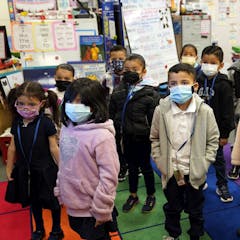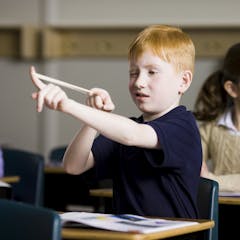
Articles on Kindergarten
Displaying 1 - 20 of 47 articles

Kindergarteners’ literacy and active play are both grounded in the science of learning.

We need to ensure the best scientific research in play-based learning and early reading is leveraged, and teachers receive supports to meet children’s developmental and academic needs.

It makes good economic sense to lean on the neighbourhood public school in the push to expand early learning.

Access to schooling for four-year-olds is inconsistent across Canada. Families need to know children are immersed in high-quality early learning, and they shouldn’t be exhausted searching for it.

Parents need to directly hear from teachers and administrators via open houses or parent advisory councils to lift the fog of confusion and concern surrounding this change.

How should we understand what toys or ‘loose part’ materials support children’s play, and what’s the relationship of parents’ education and income to this? A study aims to find out.

A study following Ontario students between 2004 and 2012 can help policymakers ensure all students get the supports they need when they need them.

There is a lot of pressure on the transition to ‘big school’. For parents, this raises the question of how best we can prepare our kids and ourselves for this time.

People, policies, practice and place all matter in publicly funded, school-based children’s early learning programs.

Parents and caregivers are vital partners in education, and together, educators and families can ease back-to-school jitters and help make this an exciting and positive transition for children.

Canada has much to learn from other countries about better ways of providing learning and care for children.

The lack of a fully interactive environment in kindergarten due to pandemic school closures may negatively impact some children’s learning in later grades.

The core principle of education is to enable students to become kind, giving and contributing members of their community and the world.

Kindergartners who are relatively younger than their classroom peers are at risk for doing less well in school. A clinical psychologist explains how to reduce those problems.

A study of students across Canada between 2004 and 2015 provides an estimate of anxiety symptoms in kindergarteners, and can serve as a baseline for comparing children’s anxiety after COVID-19.

Kindergarten educators who taught from home during COVID-19 and who were primarily responsible for their own children self-reported poorer mental health than those without these responsibilities.

Children who are bullied in school are at higher risk for depression and anxiety later in life.

Grocery shopping and family meals are prime opportunities to build reading and math skills – particularly for young Latino children, a new study finds.

When you layer a pandemic on top of back-to-school, many children may struggle with separation anxiety. Here are some strategies parents can use to help reduce anxiety in their children.

Accessing “knowledge-rich” content assumes language and literacy competencies that take time for children to develop. Childhood cannot be rushed.
